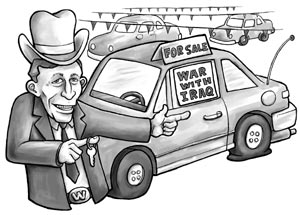Donate to IMPACT
Click below for info


• Over-Priced Musings
• Quickies
(music reviews)
 • E-Mail Comments
• Archives
• Subscribe to IMPACT
• Where to Find
IMPACT
• Buy IMPACT T-Shirts
• Ordering Back Issues
• Home
|

art/W. Ralph Walters Worse Things
Selling a war is a very difficult proposition. Our country's push toward war in Iraq has been sold to us, through various sources, with a three-pronged argument.
The first argument was to address Iraq's alleged pursuit of weapons of mass destruction, illegal under United Nations resolutions. Fine--I'll buy that, if it ever gets proven. As of this writing, it hasn't, but I'll keep an open mind.
The second argument was Iraq's connections with terrorist organizations. Maybe I'll buy that too, if it comes to be proven as well. I'm guessing that Iraq is probably connected to terrorism in much the same way that the state of Washington is connected to the proliferation of Microsoft Windows.
The third argument, and most troublesome to me, was the notion that freeing the people of Iraq from a tyrannous dictator was the absolute right thing to do; that this war was a shining example of American leadership in combating evils of the world. We will bring Jeffersonian democracy to a people who have never known freedom.

Is this a signal that America is becoming an empire, preparing to conquer and impose our form of government on the globe, or is this just an idealistic pep rally aimed at drumming up moral support for the war when tangible reasons fall utterly short in their persuasion?
Let's just assume for a moment that liberating Iraq from its oppressive regime is our reason for going in. Already we have proven that our moral duties are at best selective, as this nation has allowed too many corrupt regimes to exist for far too long and allowed too many tremendous atrocities to occur before our very eyes. Trouble spots around the world are many and varied, with myriad moral causes to be fought. But which ones will we choose in the future? Which ones are being chosen now?
Central Africa is the worst hellhole on earth, where conditions are far, far more horrific than life in Iraq, and they have been for decades. Consider the ethnic cleansing in Rwanda in 1994. The US and UN did next to nothing to stop the murder of as many as 800,000 people by Hutu extremists that April, yet a few years later we bombed Yugoslavia for a month after years of ethnic cleansing on a similar scale.
In the Congo, about 12,000 children are serving as soldiers in a Civil War that broke out in 1996 after the fall of Zaire and dictator Mobutu Sese Seko. Troops supported by several nations continue to fight in this war. At least 50 percent of soldiers in the Congo, Malawi, Uganda, Angola, and Zimbabwe are HIV-positive, and they roam the countryside indiscriminately raping village folk, who are often uneducated and cannot afford clothes.
Meanwhile, in the war on terror, we are allying ourselves with countries such as Eritrea, seeking to base troops there for operations in the region. It is a country that is just emerging from a war with Ethiopia, and which has not allowed private publications to exist since September 2001. In fact, a recent survey by Reporters Without Borders ranked Eritrea below Iraq in press freedom. The country has an appalling human rights record, detaining its citizens for legitimate dissent.
When we start using language about moral obligations to other nations' people, we don't just make ourselves feel good about our perceived selflessness, we make other countries feel really scared of it. As soon as a country starts basing its foreign policy on a moral reshaping of the world (which we must do since we have no large evil like the Soviet Union to combat anymore), it has entered the transitional zone towards the realm of fascism. It's a dirty, dirty word, but if America becomes the savior and central authority of the nations we "liberate," we will be fascists--not in terms of individual leadership, but of other states' role in our affairs. We may mean well, but we have a thoroughly vile lack of consistency in our arguments and actions, which should lead any thinking person to question our motives.
Unless, of course, our selective moral judgments have more to do with economics and the stability of a region we depend on. I hate to harp on economic interests, but there is no money to be made in stabilizing Africa. So let us cease this baseless, cotton candy elevation of our ethics and stick to the less abstract reasons for engaging in this conflict, because we have scarcely a leg to stand on.
One thing will be curious--I wonder how many yellow ribbons and American flags people are going to adorn their cars with once this war gets underway. Difficult to say, but I'm betting not nearly as many as the last time we did this.
•
Email your feedback on this article to editor@impactpress.com.
Make an IMPACT
Other Overpriced Musings by Don Pflaster:
|




